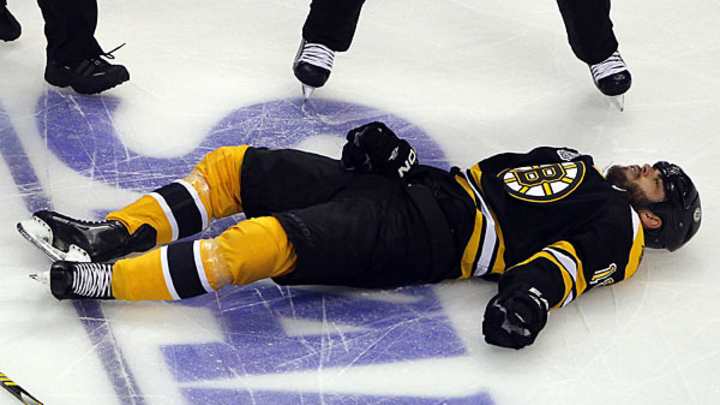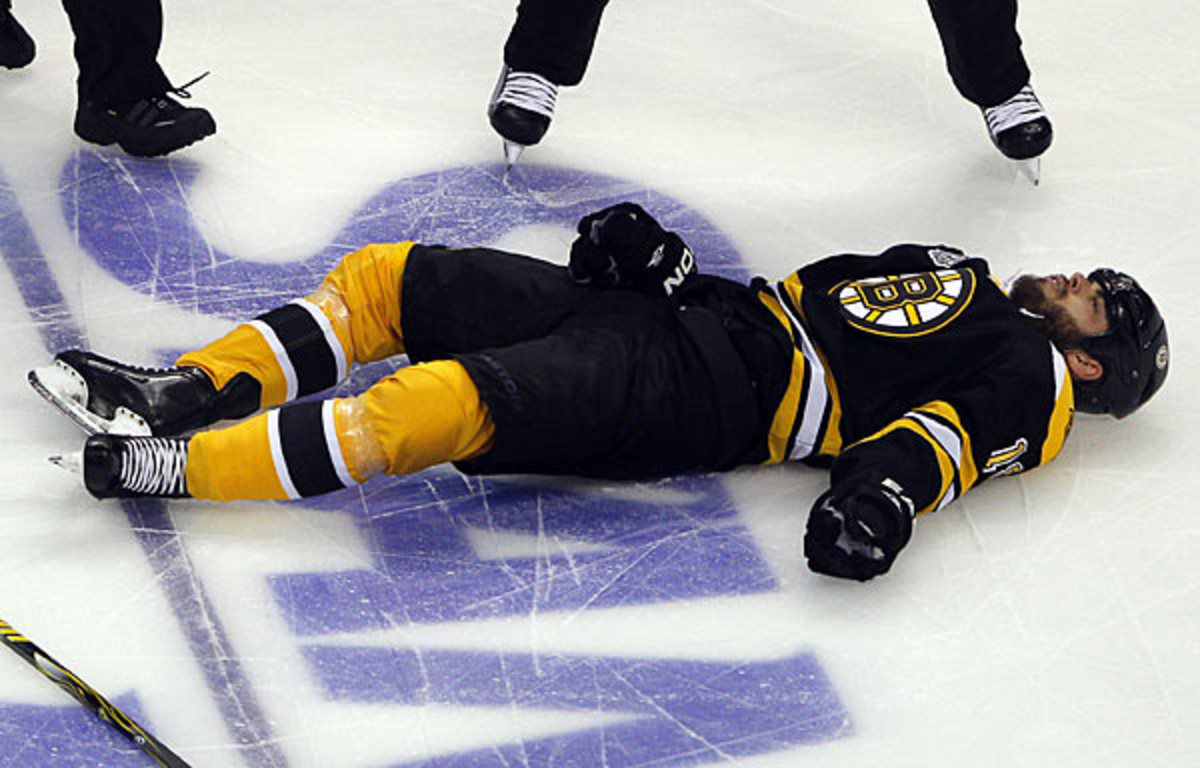NHL unlikely to tame angry Stanley Cup Final

It's always hard to know how the NHL's supplementary discipline czars will react to incidents like Nathan Horton's season-ending concussion in Game 3 of the Stanley Cup Final. (Brian Snyder/Reuters photos)

By Stu Hackel
We're thinking about Nathan Horton this morning and hope the words we hear about his condition allay the fears caused by the sight of him staring blankly at the ceiling, arm extended upward, and eventually writhing at center ice during the first period of Game 3 in Boston.
[vodpod id=Video.10484278&w=425&h=350&fv=]
After a morning hearing, Mike Murphy of the NHL will rule today on the hit by Canucks defenseman Aaron Rome that sent the Bruins winger to Massachusetts General Hospital. It certainly deserves a suspension. It was clearly a late hit, well after Horton passed the puck, and Rome was given an interference major and a game misconduct. That his hit resulted in a serious injury should be enough to keep Rome in street clothes for at least Game 4.
But -- as we've seen repeatedly this season -- you never know.
[UPDATE - Rome was given a four game suspension by the NHL. Yep, you never know.]
Of course, even during the regular season, this kind of incident can sometimes result in a mystifying exoneration, as when the Bruins Zdeno Chara escaped further punishment after his interference major and game misconduct for a dangerous hit on Montreal's Max Pacioretty, one that left the Canadiens' winger concussed and with a fractured vertebra. Murphy called that a hockey play gone wrong in excusing Chara.
But you certainly never know in the playoffs. A Yuletide generosity of spirit descends upon the NHL's Hockey Operations Department and almost every infraction that would earn a few games worth of unpaid leave between October and mid-April is magically reduced to a single game or even dismissed entirely. The Burrows Bite at the start of the Cup final, which would have earned a couple of games had it happened during the season, was pardoned by Murphy for lacking conclusive evidence, much to the astonishment of any hockey fan with a television.
That not only prompted an outcry from many, but also helped jack up the ill will between two teams who don't play nicely with others under normal circumstances. Alex Burrows later emerging as the hero of Game 2 for the Canucks only made things worse.
We've made the point a few times this season that when NHL Hockey Operations declines to take a meaningful stand on conduct that should not be in the game, it invites an escalation of bad behavior. And sure enough, Game 3 was filled with nastiness, and the hit by Rome on Horton was the worst of it.
Other bad moments followed. In Game 2, the irritating Canuck Maxim Lapierre taunted Boston's Patrice Bergeron, whose finger Burrows had snacked upon in Game 1, by inviting Bergeron to bite his (video). That deserved some sort of penalty (an unsportsmanlike conduct minor or a 10 minute misconduct), but nothing came of it. So the offended B's responded twice last night, first when Mark Recchi (video) and then Milan Lucic tried to thrust their fingers in Lapierre's mouth.
These incidents don't seem like serious offenses taken on their own. They're more comical than anything. But they anger the opposition, cause inflammatory words to fly, and put a sharper edge on the game's physical element. In the context of an extremely hard-fought Stanley Cup Final between two oft-intemperate clubs, they only serve to escalate tensions to the point where bad things are inevitable.
This train of events could have been prevented had the NHL given Burrows an appropriate suspension. And that leads to a second point we've made before. Lessening the severity of punishment during the playoffs is a senseless policy. The rationale is that at the most important time of the season, Hockey Ops (and by extension the GMs) don't want to be in a position of influencing the outcome of a series by taking players out of the lineup for any but the most severe violations.
The exact opposite should be in effect. Because it is the most important time of year, committing a foul that injures an opponent should probably result in a more severe punishment than during the regular season because the impact on the victim's team is more significant.
We're not expecting things to change, however. Not now, anyway. After letting this stuff build up, you have to wonder if even the four-game suspension to Aaron Rome will tame this angry Stanley Cup Final.
